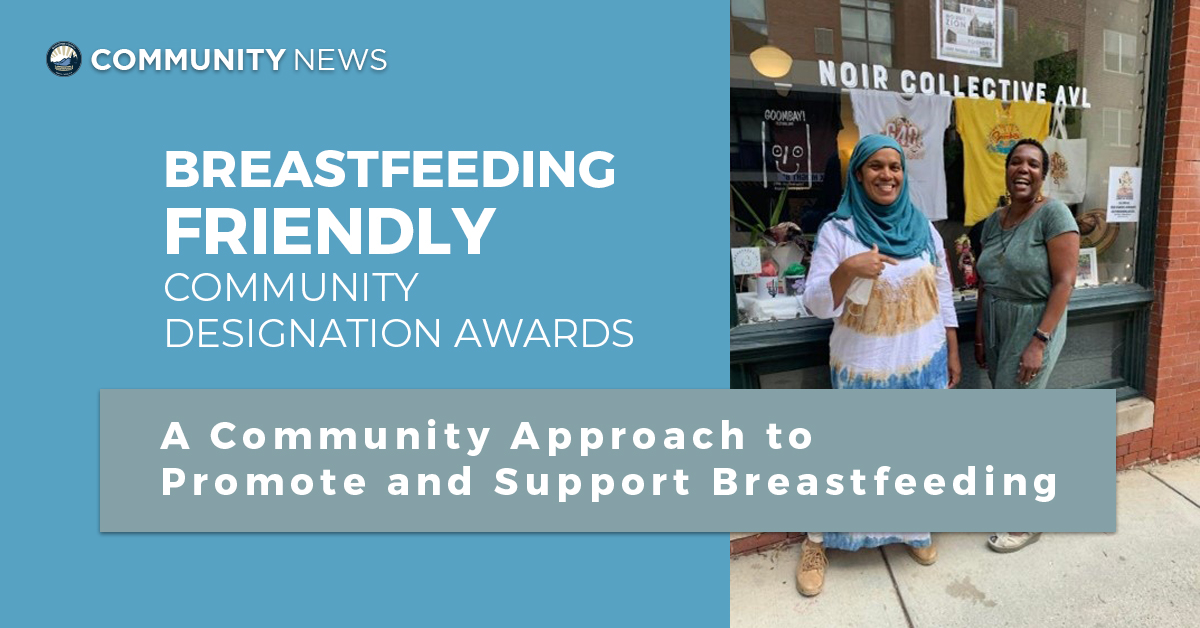This news item expired on Saturday, April 30, 2022 so the information below could be outdated or incorrect.

(Photo: Melissa Henry (L) and Alexandria Monque. Photo courtesy of M. Henry)
Breastmilk is the optimal source of nutrition for babies and breastfeeding provides beneficial health effects for both infant and the breast/chestfeeding parent. Infants who are breastfed have multiple positive health outcomes, including increased bonding and decreased rates of sudden infant death syndrome, childhood infections, and childhood obesity (1). Long-term benefits for both child and parent include reduced risks of obesity, diabetes, hypertension, and certain cancers. (2) Breastfeeding plays such a significant role in improving overall population health that one of the Healthy People 2030 goals is to increase the number of infants breastfed for their first year of life (3).
Breastfeeding may appear to be an individual’s choice; however, no one breastfeeds alone. Despite the health benefits of breastfeeding, many parents experience challenges in initiating and continuing breastfeeding. In addition, there are also disparities in breastfeeding rates among racial groups(4). Social support, workplace policies, and historical oppression and trauma all influence breastfeeding. Approaching breastfeeding as a community-wide initiative, creates a community culture in which breastfeeding is supported in all the places where we live, work, play, and worship.
Becoming a breastfeeding-friendly community requires support for reducing the conditions and perceptions that are barriers to breastfeeding. The Breastfeeding Friendly Community Designation Program is designed to do just that by providing outreach education and technical assistance so that owners and leaders in businesses, organizations, educational and clinical settings understand how to normalize and support breastfeeding for their employees and customers. For their efforts, they receive award recognition as a Breastfeeding Friendly Designation with promotional materials. Led by Buncombe Partnership for Children’s Natasha Bowden and Melissa Henry, and supported by Buncombe County Breastfeeding Coalition and BCHHS Health Promotions Team, multiple businesses, organizations, and early education programs have been recognized through the Breastfeeding Friendly Designation Awards.
Noir Collective AVL received its Breastfeeding-Friendly Designation Award in February 2022. Noir Collective AVL is a Black-owned boutique shop & art gallery featuring Black entrepreneurs. Owner, Alexandria Monque, states that she feels that supporting breastfeeding is important because nursing mothers have the right to privacy, the right to breastfeed in public and that she supports the work that Melissa Henry is doing in the community.
Ms. Henry states, “I am excited now to be involved in helping local businesses make sure their spaces are inclusive, safe, & welcoming. So many business owners are on board to prevent nursing mamas from being asked to cover up or move while breastfeeding in public spaces. If a mother needs to find a private place to feed her baby every time she goes out of the house, she’s likely to wean early… Public education and increased awareness is key. In my role as a breastfeeding advocate, I am working to create a ubiquitous amount of support for nursing mamas in Buncombe County. I want nursing mamas to be treated like the superstars they are! Building a Breastfeeding Friendly Network is crucial to a healthy community. Businesses are joining together to help normalize breastfeeding! I am particularly concerned about low breastfeeding rates within the Black community. We are faced with structural barriers that hinder our ability to breastfeed, and it is a health crisis that we have the lowest initiation rates among all racial groups. Black women are more likely than others to return to work earlier than 12 weeks, and we tend to be confronted with other difficulties that make nursing and pumping a challenge. For these reasons, I started with downtown Asheville focusing on the Block, the historic African-American center, and from there expanded throughout the county. So far 12 businesses have signed up to receive the breastfeeding-friendly community partner designation, including two in the YMI. Many more businesses are in the process. We have so much work to do! By publicly committing to provide a welcoming atmosphere and ensuring all staff members fulfill the requirements, these businesses are working for the good of the community at large.”
Office of the Surgeon General (US); Centers for Disease Control and Prevention (US); Office on Women's Health (US). The Surgeon General's Call to Action to Support Breastfeeding. Rockville (MD): Office of the Surgeon General (US); 2011. The Importance of Breastfeeding. Available from: https://www.ncbi.nlm.nih.gov/books/NBK52687/)
Binns, C., Lee, M., & Low, W. Y. (2016). The Long-Term Public Health Benefits of Breastfeeding. Asia-Pacific journal of public health, 28(1), 7–14. https://doi.org/10.1177/1010539515624964)
Office of Disease Prevention and Health Promotion. (n.d.). Diabetes. Healthy People 2030. U.S. Department of Health and Human Services. https://health.gov/healthypeople/objectives-and-data/browse-objectives/diabetes
Chiang KV, Li R, Anstey EH, Perrine CG. Racial and Ethnic Disparities in Breastfeeding Initiation - United States, 2019. MMWR Morb Mortal Wkly Rep 2021;70:769–774. DOI: https://www.cdc.gov/mmwr/volumes/70/wr/mm7021a1.htm?s_cid=mm7021a1_w